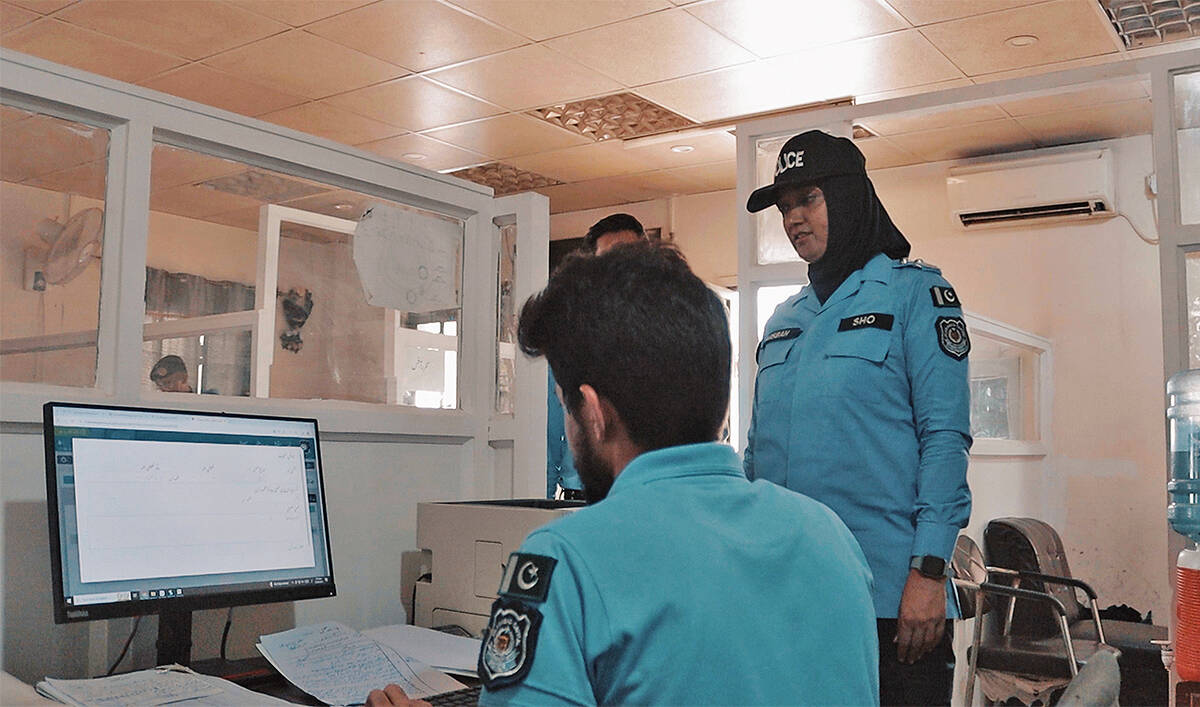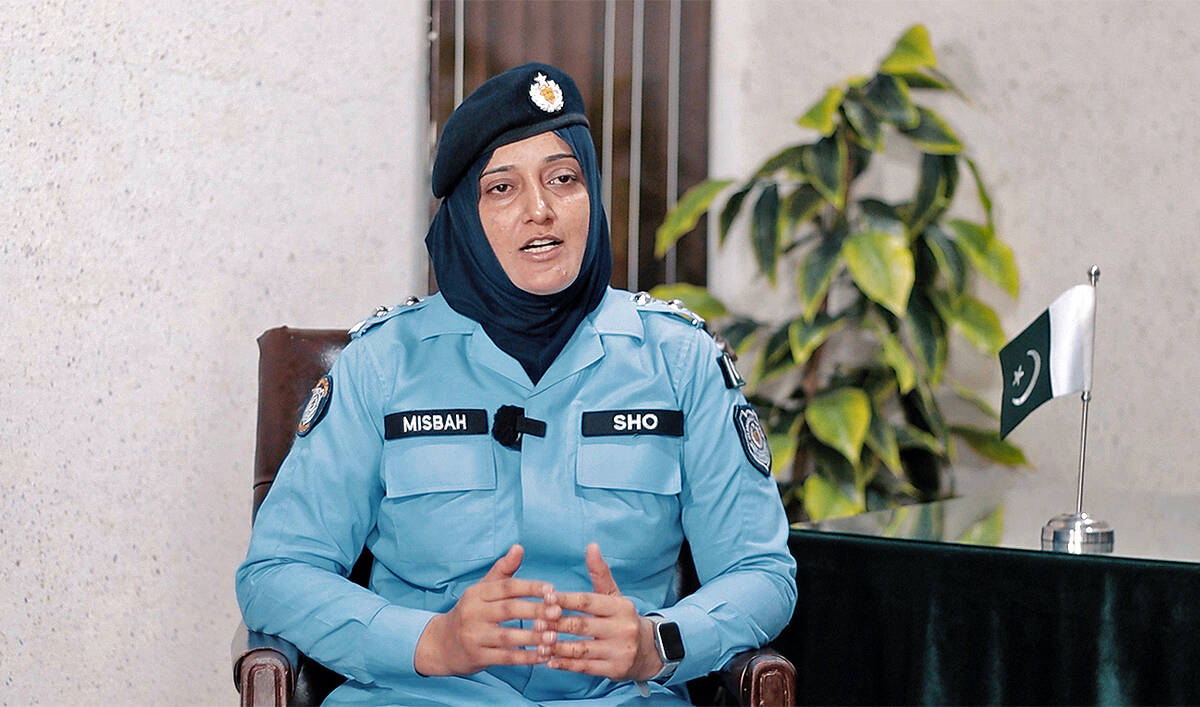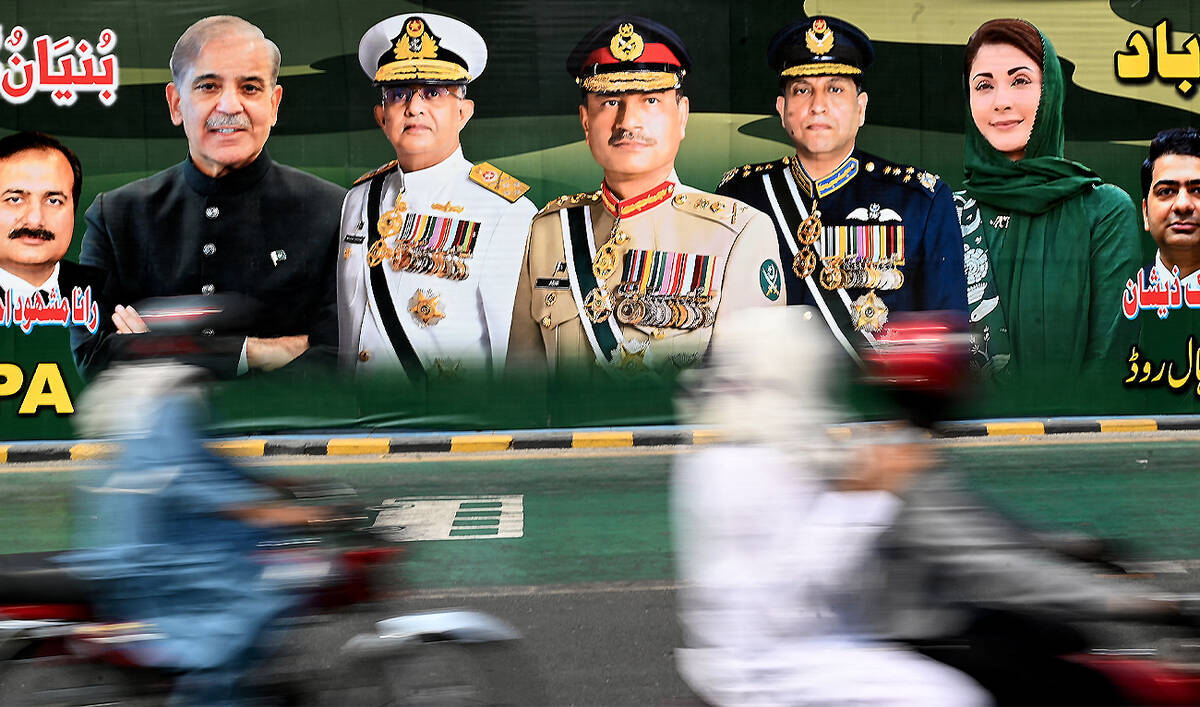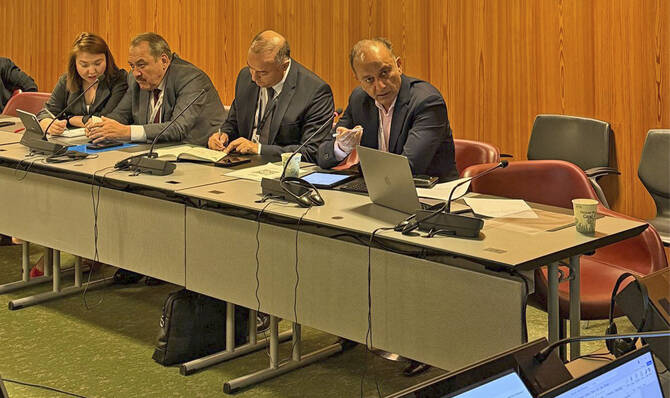ISLAMABAD: Pakistan’s Environment Minister Musadik Malik on Wednesday urged the international community to ease access to climate finance for vulnerable nations, saying Pakistan contributes less than one percent to global emissions but remains among the hardest hit by climate change.
Speaking in Geneva at a UN Capital Development Fund session on the sidelines of the Basel, Rotterdam and Stockholm (BRS) Conventions, Malik said developing countries like Pakistan face mounting climate threats despite minimal emissions and need more support from global financial institutions.
The BRS conventions are multilateral environmental agreements which focus on hazardous chemicals and waste management.
“Pakistan is among the countries most severely affected by climate change,” the Pakistani minister said, according to an official statement, adding this was despite the fact that it “contributes less than one percent to global carbon emissions.”
“The federal minister emphasized the need to simplify climate finance support,” the statement continued.
Malik reaffirmed Pakistan’s commitment to the Paris Agreement, a legally binding international treaty aimed at limiting global warming to below 2°C.
He said Pakistan was actively pursuing its Nationally Determined Contributions (NDCs), with a focus on green growth, renewable energy and sustainable water systems.
Pakistan has faced recurring heatwaves, droughts and devastating floods.
In 2022, unprecedented monsoon rains left a third of the country submerged, killing about 1,700 people and leading to over $35 billion in infrastructure damage.
Pakistan also played a leading role in establishing the global loss and damage fund for climate-hit countries, though the mechanism has yet to become fully functional.
“Global development is not possible without climate justice,” Malik said, as he appealed for effective cooperation from international financial institutions for developing countries.
Pakistan urges simpler climate finance for vulnerable nations at Geneva forum
https://arab.news/yjdyq
Pakistan urges simpler climate finance for vulnerable nations at Geneva forum

- Environment Minister Musadik Malik says global development not possible without climate justice
- He says Pakistan is highly climate-vulnerable despite contributing less than 1 percent to global emissions
Pakistan army chief calls for dialogue, diplomacy to resolve regional conflicts during US visit

- Field Marshal General Syed Asim Munir interacts with American scholars, analysts, foreign media outlets’ representatives in Washington
- Munir calls for “broader” relationship with Washington based on mutual respect, shared strategic interests and economic interdependence
ISLAMABAD: Pakistan’s army chief advocated for dialogue and diplomacy to resolve regional conflicts in his interaction with American policy experts, analysts, scholars and representatives of foreign media outlets, the military’s media wing said on Friday amid Islamabad’s simmering tensions with New Delhi.
Munir is on a solo trip to the US, where he met President Donald Trump for lunch on Wednesday in an unprecedented White House meeting. Trump told reporters afterward that the two had discussed the ongoing Iran-Israel crisis, and that the main reason he wanted to meet Munir was to thank him for not pursuing war with India last month.
Pakistan and India remained engaged in a military confrontation for four days last month before Washington brokered a ceasefire between the two on May 10. Pakistan has since then sent delegations to various capitals around the world, urging countries to persuade India to resolve bilateral issues with Islamabad via dialogue and diplomacy.
“The Army Chief also provided a detailed exposition of Pakistan’s balanced approach to regional and global conflicts, advocating for dialogue, diplomacy, and adherence to international law,” the Inter-Services Public Relations (ISPR), the military’s media wing, said. “He reaffirmed that Pakistan continues to play a responsible and proactive role in mitigating regional tensions and promoting cooperative security frameworks.”
Munir also spoke about Pakistan’s recent conflict with India, elaborating on Pakistan’s perspective on “terrorism.” Without naming anyone in particular, the Pakistan army chief spoke about the influence of regional actors in sponsoring and perpetuating “terrorism” as a tool of hybrid warfare.
“The COAS emphasized that Pakistan has been on the front lines of the global war against terrorism, having rendered immense sacrifices— both human and economic— in pursuit of a safer and more secure world,” the statement said.
Pakistan denies India’s allegations it supports militant attacks in the part of disputed Kashmir that New Delhi governs. After the April 22 attack in Pahalgam, a tourist resort in Indian-administered Kashmir, tensions between the two countries surged as New Delhi blamed Islamabad for being involved. Pakistan denied the allegations and called for an impartial, international probe into the incident.
The Pakistan army chief spoke about his country’s untapped potential in information technology, agriculture and its underexploited reserves in the mining and mineral sectors. Munir invited international partners to explore collaborative opportunities in these sectors to unlock “shared prosperity,” the ISPR said.
The discussion between Munir and the participants also involved an evaluation of the long-standing Pakistan–US partnership, the military’s media wing said.
“The COAS [chief of army staff] underlined the historical convergences between the two nations, particularly in areas such as counterterrorism, regional security, and economic development,” the ISPR said.
“He underscored the immense potential for a broader, multidimensional relationship built upon mutual respect, shared strategic interests, and economic interdependence.”
The ISPR said the interaction was marked by mutual understanding and was widely regarded as a “positive step” toward enhancing strategic dialogue between the two countries.
Pakistan’s military plays a key role in shaping the country’s foreign policy, and Munir’s high-profile White House invitation is being seen as part of Washington’s broader effort to recalibrate ties with Islamabad, a vital but often difficult ally for the US in South Asia.
Under Trump, Islamabad and Washington both have appeared eager to rebuild military and economic cooperation after years of strained ties, largely over counter-terrorism disagreements.
Islamabad’s first woman to lead men’s police station takes on drug lords, land mafia

- Misbah Shahbaz is SHO of Phulgran, Islamabad suburb long a magnet for drug and land-grabbing gangs
- Only about 3.2% of officers in Pakistani police are women, just 15,509 women out of 489,645 total
ISLAMABAD: Tucked amid the dust and bustle of Islamabad’s fringes, the suburb of Phulgran has long been a magnet for trouble: drug dens, land-grabbing, and a loose grip on law and order.
But now, it has something new: a phenomenon.
In her blue uniform and a modest headscarf, Misbah Shahbaz quietly took charge in 2025 as Station House Officer (SHO) of Phulgran, Islamabad’s first-ever female SHO at a general, or men’s, police station.
The post of SHO is one of the most visible and operationally significant leadership roles in Pakistan’s police hierarchy, responsible for crime investigation, public safety, and station-level administration. Until now, female SHOs in Islamabad had only led women police stations.
“It’s a historic decision, and I feel very proud,” Shahbaz told Arab News as she walked through a briefing with her team.

Phulgran sits at the nexus of rural sprawl and urban ambition, where narcotics and land mafias thrive. Shahbaz’s three-fold roadmap is simple: Clean up the drug trade, target land-grab networks, and raise the ethical bar in policing.
Methodical yet unspoken in her stride, she is already tackling the tough territory:
“Drug trafficking is a major concern. I’ve already developed strategies … and God willing, you’ll soon see the results.”
Her academic résumé reads like an MBA case study: she holds a Master’s and an MBA. But she insisted:
“I’ve always been drawn to the uniform … This was never about the degree, it was about a passion to serve.”
Back in 2012, Shahbaz took one of the 87 Assistant Sub-Inspector slots based strictly on merit. And that was just the beginning of a journey in which she says her male colleagues largely treated her as an equal.
“I was lucky to have excellent mentors, all-male officers who treated me no differently,” she said. “They taught me the finer points of investigation, from identifying subtle clues to interviewing techniques.”

Today, when Shahbaz rolls through Phulgran in her official vehicle, residents pause. Men nod, women whisper encouragement and in the sidewalks, young girls see her, and absorb a message: you, too, can wear the badge.
“She’s not less than any man,” a constable under her command said. “In fact, she leads better.”
TURNING TIDE?
Let’s zoom out: Pakistan’s police force is staggeringly male.
According to the National Police Bureau (NPB) and UN Women Pakistan as of 2023, only about 3.2 % of officers are women, just 15,509 women out of 489,645 total. And while Islamabad fares slightly better, with around 5% of women, most provinces hover at 1–4%.
A mandatory 10 % quota exists but the officers actually recruited, trained, and retained are far fewer. In some provinces, it’s under 1%.
So, Shahbaz’s promotion is more than symbolic. She’s a breakthrough not just for Islamabad but for an entire force held back by gender disparity.
With so few female officers, women are often reluctant to report crimes, especially those involving domestic or gender-based issues. Experts also say the absence of women in decision-making and field leadership reduces community trust in law enforcement.
Female officers like Shahbaz could change that balance.
And her rise isn’t just a personal triumph. It’s the latest clue in the slow shift in a system where less than 1 in 30 cops is a woman.
As the police officer said:
“Islamabad Police already have a reputation for professionalism but I want to raise the bar so that every citizen feels heard and respected.”
Veteran Pakistani actress Ayesha Khan passes away in Karachi— report

- Ayesha Khan, 77, found dead in her flat in Karachi’s Gulshan-e-Iqbal area, local media widely reported
- Khan had played prominent roles in iconic drama serials “Afshan,” “Uroosa and “Shaam Se Pehle”
ISLAMABAD: Veteran Pakistani actress Ayesha Khan was found dead in her flat in Karachi this week, various news outlets reported on Friday as tributes poured in from colleagues who had worked with her.
As per reports in prominent Pakistani news websites such as The News, Geo.tv and other publications, 77-year-old Khan was found dead in her flat in Karachi’s Gulshan-e-Iqbal area on Thursday. Quoting police, local media reports said Khan’s body seemed to be around a week old when it was found, adding that the actress was living alone.
Khan starred in several high-profile Pakistani drama serials such as “Afshan,” “Uroosa,” “Aanch,” “Bandhan” and “Shaam Se Pehle.” Fellow actors and colleagues paid tribute to the actress as news of her death spread.
Prominent actor Adnan Siddiqui recalled working alongside Khan in Uroosa, which was his first drama serial.
“She was my on-screen mother but brought a compassion reminiscent of a maternal figure, a presence that soothed, grounded and made a space feel more human,” Siddiqui wrote on Instagram.
Siddiqui said Khan was never loud but rather calm and let her “acting do the talking.”
“Ayesha jee wasn’t just an actor; she was an atmosphere. And her absence will be deeply felt,” he wrote.
“Devastating. Rest in peace, Ayesha ji,” Pakistani actress Anoushay Abbasi wrote beneath Siddiqui’s post.
As per Geo News, Khan’s body was discovered when her neighbors informed her family about a “foul smell” emitting from the actress’ apartment.
“After being informed, police rushed to the scene and shifted her body to the Jinnah Postgraduate Medical Center for medico-legal formalities,” the report said. It added that police said a post-mortem would be conducted if requested by the family.
Later, Khan’s body was shifted to Edhi Foundation’s mortuary in Karachi’s Sohrab Goth area, the report stated.
Saudi Arabia’s KSrelief performs over 4,484 successful eye surgeries in Pakistan

- KSrelief holds free eye treatment camps in Sindh, Balochistan, Punjab and Azad Kashmir regions
- Teams examined 43,294 patients, distributed 11,050 eyeglasses free of charge, says state media
ISLAMABAD: Saudi Arabia’s King Salman Humanitarian Aid and Relief Center (KSrelief) performed over 4,484 successful eye surgeries across Pakistan under a voluntary program to provide free medical services to the underprivileged, state-run media reported this week.
The state-run Pakistan Television (PTV) reported on Thursday that KSrelief successfully concluded 11 comprehensive eye treatment camps in Pakistan under the “Noor Saudi Volunteer Program 2025.” These camps, PTV said, were organized in collaboration with the Al-Basar International Foundation and Ibrahim Eye Hospital Karachi.
The camps were held to provide free medical services to underprivileged individuals suffering from blindness or other eye-related ailments, it added. These camps were organized in both the urban and rural areas of Pakistan’s Sindh, Balochistan, Punjab, and Azad Jammu and Kashmir regions where access to quality eye care services remains limited, PTV said.
“During the campaign, medical teams examined a total of 43,294 patients and performed over 4,484 successful surgeries,” the state television said. “Additionally, 11,050 eyeglasses were distributed free of charge, along with the provision of prescribed medications to deserving patients.”
It said these camps were conducted in various Pakistani cities such as Karachi, Matli, Kandhkot, Shikarpur, Hyderabad, Naseerabad, Kharan, Khuzdar, Jhelum and Rawalakot. The camps enabled thousands of patients to benefit from specialized eye treatments due to which many were able to regain their vision.
“This initiative reflects the Kingdom of Saudi Arabia’s strong humanitarian commitment and its dedication to enhancing the lives of people affected by visual impairments,” PTV said.
KSrelief has implemented hundreds of projects in Pakistan worth millions of dollars to improve the lives of vulnerable communities. Efforts include emergency relief for natural disasters, and long-term projects addressing food security, health care, education, and shelter.
The Saudi charity organization has one of the largest humanitarian budgets available to any aid agency across the world, which has allowed its officials to undertake a wide variety of projects in more than 80 countries. Pakistan is the fifth largest beneficiary of its aid and humanitarian activities and has greatly benefited from its assistance since the 2022 monsoon floods.
Pakistan’s defense minister says hybrid model ‘doing wonders’ as army chief on solo US visit

- In rare comments by a sitting minister, Khawaja Asif describes civil-military hybrid system as “co-ownership of the power structure”
- Army chief’s extended White House meeting with President Trump highlights military’s growing role in security, economic initiatives
ISLAMABAD: Pakistan’s defense minister has described the country’s governance as a “hybrid model” in which military and civilian leaders share power — an open secret in political circles but a rare public admission by a serving official that has taken on added significance amid the army chief’s solo visit to the United States and an unprecedented meeting with President Donald Trump.
Officials have presented Field Marshal Asim Munir’s trip as an effort to bolster security ties with Washington, particularly in light of last month’s military standoff with India and escalating hostilities in the Middle East. But the army chief’s meeting with Trump — without Pakistan’s prime minister or foreign minister present — has also drawn renewed attention to how much Islamabad relies on its army to handle high-stakes foreign relations, economic ties and sensitive regional issues.
The chief’s visit comes on the heels of the most serious clash in years between nuclear-armed Pakistan and India in which they exchanged drone, missile and artillery fire until a ceasefire brokered by Washington on May 10 brought an end to hostilities. Pakistan has declared victory in the confrontation, saying it downed six Indian fighter jets and struck military facilities. Munir’s leadership during the crisis has won him a rare promotion to field marshal and broad public support, reinforcing the military’s standing as one of the country’s most influential institutions despite past criticism of its outsized role in politics.
In an interview this week conducted as the army chief visited the United States for talks with Trump, Defense Minister Khawaja Asif acknowledged that the military’s prestige had “skyrocketed” after the conflict with India, calling it a “blessing in disguise,” but rejected that this would erode democratic authority or give the army unchecked control.
“No, it doesn’t worry me,” he told Arab News when asked if Pakistan’s history of direct and indirect military rule made him uneasy about the army’s stronger image.
“This is a hybrid model. It’s not an ideal democratic government … So, this arrangement, the hybrid arrangement, I think [it] is doing wonders,” Asif said, adding that the system was a practical necessity until Pakistan was “out of the woods as far as economic and governance problems are concerned.”

The long-running political instability and behind-the-scenes military influence in earlier decades had slowed democratic development, the defense chief argued, but the current arrangement had improved coordination.
Pakistan’s military has played a central role in national affairs since independence in 1947, including periods of direct rule after coups in 1958, 1977 and 1999, when General Pervez Musharraf toppled then-Prime Minister Nawaz Sharif, the elder brother of current Prime Minister Shehbaz Sharif. Musharraf ruled until 2008 when elections restored civilian governance. Even under elected governments, however, the army is widely considered the invisible guiding hand in politics and in shaping foreign policy, security strategy, and often key aspects of governance.
“If this sort of [hybrid] model was adopted way back in the 90s, things would have been much, much better,” Asif said, “because the confrontation between [military] establishment and the political government, it actually retarded the progress of our democracy.”
By contrast, he said, the current “de facto” hybrid arrangement had brought the army and elected leaders together on joint forums such as the Special Investment Facilitation Council (SIFC), a civil-military body tasked with setting and managing economic priorities jointly and overseeing big-ticket investments and trade reforms.
“We have common platforms, like SIFC and other platforms, where military leadership and civilian leadership, they sit together and decide about the business,” Asif said. “So, this is something which is a de facto arrangement and it’s working very well.”
The military’s media wing did not respond to a request for comments.
“TOTAL AGREEMENT”
Asif’s remarks about power-sharing with the army on an ever-expanding policy portfolio appear particularly relevant after Munir’s rare White House meeting with Trump on Wednesday, the first time in years that a Pakistani army chief was received by a sitting US president without civilian leadership present.
Munir was accompanied by National Security Adviser Lt Gen Muhammad Asim Malik, Pakistan’s serving intelligence chief who now also holds the national security portfolio. This too is a first for the country: that a sitting ISI director general is serving as NSA.
According to a statement from ISPR, the military’s public relations wing, the Munir-Trump meeting lasted two hours instead of the scheduled one, and covered not only security cooperation and the ongoing Israel-Iran conflict but also wider collaboration in “trade, economic development, mines and minerals, artificial intelligence, energy, cryptocurrency, and emerging technologies.”
These are areas traditionally handled by civilian ministries.
While independent analysts say this reflects the military’s increasingly visible role in economic and financial initiatives and could permanently weaken civilian supremacy in these domains, Asif insisted PM Sharif remained firmly in charge of key decisions:
“It’s something mutual, we have a co-ownership of the power structure …
“There is no superimposed system or superimposed organization on Shehbaz Sharif which dictates him and he acts accordingly … [He] is making his decisions independently and obviously he is in regular consultation with the establishment on all levels.”
But were there “crisis moments” in the relationships when the prime minister had not prevailed over the army chief in decision-making?
Asif responded:
“Believe me, very honestly, we haven’t had any moment where decisions were not made unanimously with total agreement. Things are moving very smoothly. And god willing, one day we will achieve the sort of democracy which is needed by our country.”












